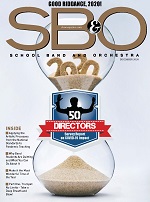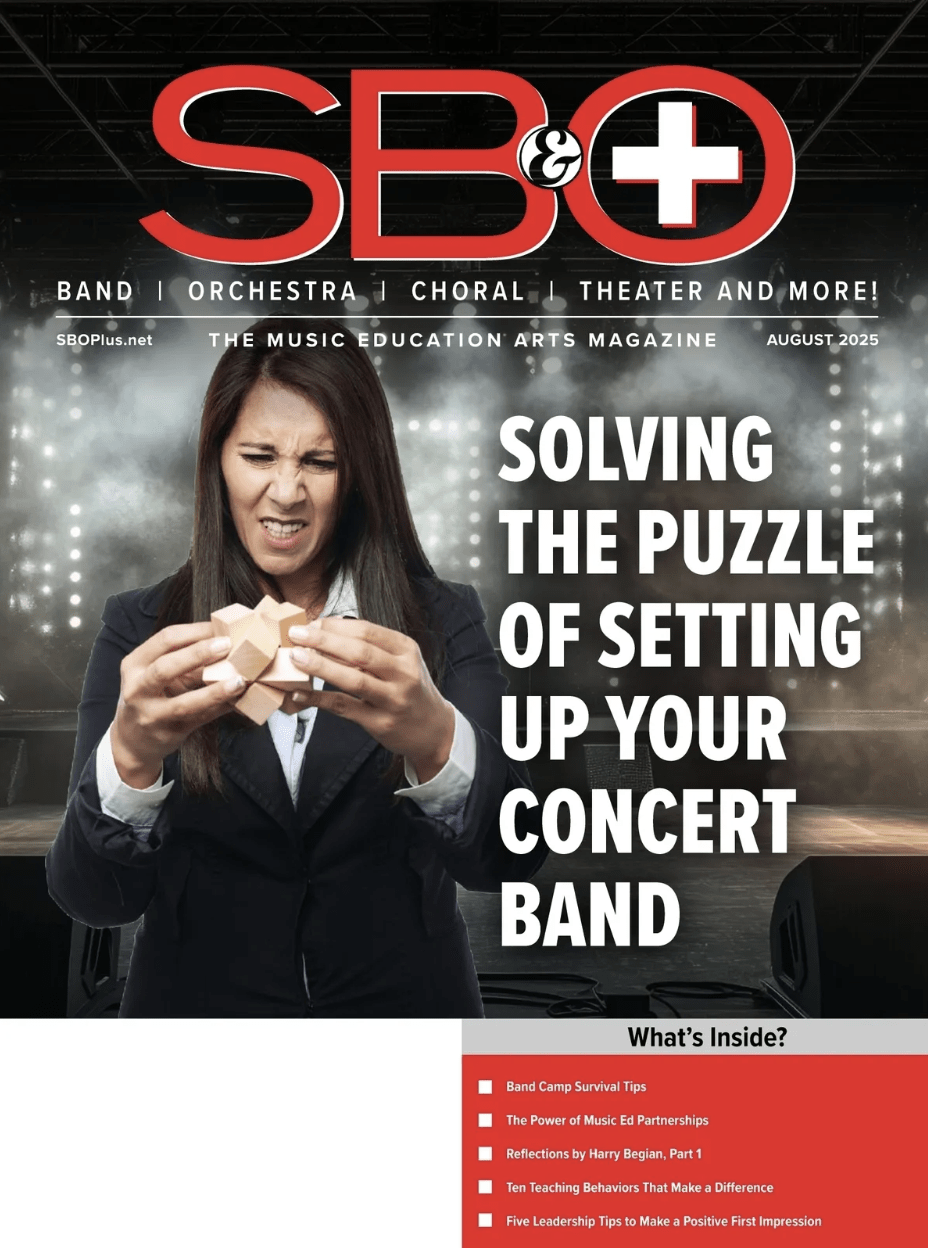This article was reprinted with permission from Tempo, the official magazine of the New Jersey Music Educators Association.
Within the past few years, the interest and need for curriculum integration seems to have intensified through the country for several reasons. New books, new concepts, new interpretations of what should be taught and what should be eliminated present the curriculum planner with a difficult task – especially at the middle school level. State mandates and new educational standards influence the curriculum. We need to rethink these as we select what various areas to study. There is a need to teach students how various subjects actively influence their lives and it is crucial that students understand the impact of each discipline perspective in a connected way.
In regard to the general music classroom at the middle school level, one might say, “Well, I’ve always integrated music with the classroom teachers and other subject disciplines.” Perhaps that is true, but to what degree and how detailed was the integration implemented? A mere sampling of knowledge from each discipline – a bit of history, a bit of literature, a bit of the arts, and so forth – results in a “potpourri” type of curriculum, which lacks focus. Effective interdisciplinary programs should include carefully conceived design features, such as scope and sequence, behavioral indicators of attitude change, criteria that promote and encourage critical-thinking skills and solid methods of evaluation. In “Interdisciplinary Curriculum Design and Implementation,” Heide Hayes Jacobs defines interdisciplinary as “a knowledge view and curriculum approach that consciously applies methodology and language from more than one discipline to examine a central theme, issue, problem, topic or experience. Interdisciplinary does not stress delineation but linkages.”
The importance of exploration, self-discovery and individual development of the student is the hallmark of middle school philosophy. Learning in general should be relevant to musical life beyond the classroom. Middle school students all need abundant opportunities to see application of music skills and concepts in the lives of others and to appreciate the variety of musical expressions reflected in an ethnically diverse world. Instruction should lead to the discovery of musical concepts through perception of musical qualities and events. Teachers should be open to new musical developments, especially in the area of technology, and demonstrate critical thinking about these developments on the basis of high musical standards. The planning of such experiences could occur through the general music teacher’s participation on an interdisciplinary team or teams.
General music curricula may focus on making an effort to interrelate and to integrate the many strands of the school curriculum. The benefits that result for the students are many. The building of school spirit and pride is very evident throughout the whole school. Improvement of interpersonal relations among students, parents and teachers also becomes evident and results in enhancement of overall school morale. A wholesome school climate is desirable for maturing the growth and learning of the student. Students should be given many opportunities to practice important decision-making and critical-thinking skills within a curriculum specifically designed for interdisciplinary teaching. Learning skills could be applied in carrying out real projects which focus on the historical aspects (research and historical data); the constructive and artistic aspects (creative artwork, power point presentations, creating visual props or charts); literary aspects (writing reports, recording data, keeping journals); and musical aspects (creating, performing and composing music).
The interconnecting of the various subjects in the curriculum is dramatized through application. Students must know and apply content and skills from several fields in order to complete a project successfully. In short, the relevance of the curriculum is enhanced significantly, especially if staff members follow through by having students reflect on their experiences through journals, small group discussion and additional creative writing.
Various approaches may be used for curriculum integration: the total approach in which staff members seek ways to relate both curriculum and instruction to a chosen theme. Planning and coordinating such an activity requires much time and effort. Administrative support is essential and common team planning time must be allotted for staff members. In many middle school programs, teams meet on a daily basis. Team planning time is provided in addition to individual teacher preparation time. Special subject area teachers usually are assigned to more than one team (multiple teams form a “house” within the school). The special subject area teachers meet with fellow team members once a week during scheduled team planning periods.
A drawback of the all-school approach is a high expectation from the staff to involve all subject areas all of the time. There are instances when a topic or theme may not be pertinent to a particular subject, resulting in some staff members becoming less enthusiastic, whatever the theme. In addition, most courses of study are so demanding that teachers may be somewhat reluctant to interrupt their course of study even for a short time. A typical interdisciplinary theme is usually implemented for one to two cycles of instruction (cycles are usually five to six weeks with the classes meeting daily). All-school disciplinary study may be less difficult to implement if the school is subdivided into houses (school-within-a-school) or teams. For example, a team may consist of approximately 100-150 students; a house may contain four or five teams.
Another approach to the interdisciplinary program is the “teaching team,” which consists of a language arts teacher, a social studies teacher, a math teacher, a science teacher and special subject teachers (music, art, foreign language, technology, life skills, physical education). Flexibility is the key to succeeding in a desirable interdisciplinary environment.
The following are steps toward implementing interdisciplinary teaching in the music program:
1. Review the goals and objectives for that grade level and/or subjects.
2. Review the curriculum scope and sequence; determine degree of flexibility.
3. Determine the type of interdisciplinary unit that will be attempted, correlated, fused or purely problem-centered without restriction as to subjects covered.
4. Brainstorm themes, topics or problem areas that a) fit the given curriculum; b) are interdisciplinary and c) appear to be relevant to the students.
5. Seek student reactions and input.
6. Select one or two themes, topics or problem areas for further development.
7. Explore the contribution of each subject area to the unit, including pertinent content, skills and learning activities.
8. Develop an overall framework or outline for the unit.
9. Locate learning materials and other sources – invite students to help.
10. Plan procedures for evaluating student learning.
11. Determine logistics:
a) Timeframe: full-time or part-time each day?
b) Student groupings.
c) Rooms, computers and other facilities needed.
d) Equipment needed (audio/visual/ technological)
12. Carry out the unit seeking student involvement along the way and at the conclusion.
13. Evaluate the unit.
14. Recycle unit when appropriate.
Integrated curricula should place strong emphasis on the process of learning as well as content. In a humanities-type focus, the students not only study art, history, music and literature; they make art, music, history in a setting that encourages learning and a higher level of thinking skills. They achieve cooperative/operative learning through group projects and activities. In focusing on humanities, the general music course may introduce relationships between Western themes and non-western cultures. Students may begin to establish global relationships while understanding how music is a connecting force in many cultural heritages. Cultural boundaries are crossed and, consequently, we may find ourselves teaching history, music, dance, religious influence, philosophy, math and science. The student response to this type of curriculum may be extremely positive – as they have been provided with the opportunity to explore a whole new world of culture. After middle school, only a small percentage of students will elect any courses of study in culture and non-performing arts. This may be the last opportunity to offer students who are not performance-oriented a cultural and humanistic, life-long learning experience. I think most of us would agree that all our youth need to be exposed to more culture and can all be given the opportunity to understand, experience and appreciate the arts. The following standards can all be readily implemented into an interdisciplinary program: National Content Standard No. 8, “Understanding relationships between music, the other arts and disciplines outside the arts;” and National Content Standard No. 9, “Understanding music in relation to history and culture.”
Critical-thinking strategies implement these standards: National Content Standard No. 6, “Listening to, analyzing and describing music;” and National Content Standard No. 7, “Evaluating music and music performance.
Interdisciplinary teaching is certainly no easy task, but its rewards for both student and teacher are impressive. With the emphasis on collaboration, teachers and students became creative problem-solvers. Students benefit from stimulating programs while teachers gain professionally from a process that allows them to think and make decisions, act on their visions and impart their knowledge to their students in a creative and exciting way.
Christine Sezer teaches music at Howell Township Middle School North in Farmingdale, N.J. She has been a member of many MENC division planning committees and has presented sessions on assessment, general music teaching strategies, integrating general music curriculums and choral reading sessions for the elementary and middle school levels. Sezer is a member of the NJMEA board of directors as chair for classroom music; Tri-M Music Honor Society, Chair for the Special Learner; chair for the NJMEA middle school/Jr. High Choral Festival, and MIOSM chair. She has also served on the N.J. State Assessment Committee. She is a member of the Tri-M Music Honor Society, Orff-Schulwerk Association, National Organists Guild, the Monmouth Symphony Orchestra (violin), validator for the National Board for Teacher Certification, and most recently member-at-large, Society for General Music of the MENC Executive Committee. As a curriculum consultant and author, Sezer has written and advised various general music curriculum committees in many school districts in New Jersey, Pennsylvania, Connecticut, New York, Delaware and Maryland.


























